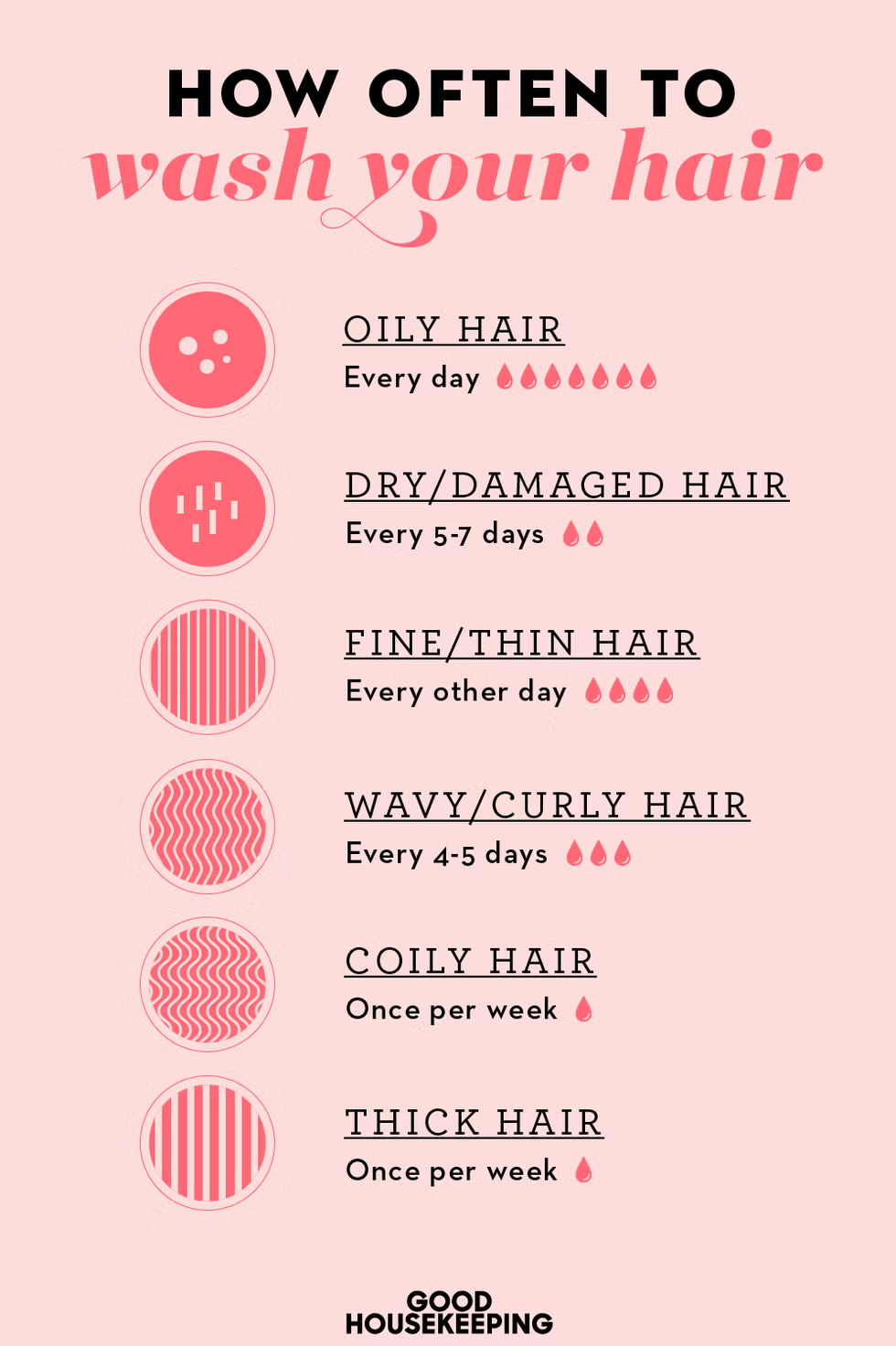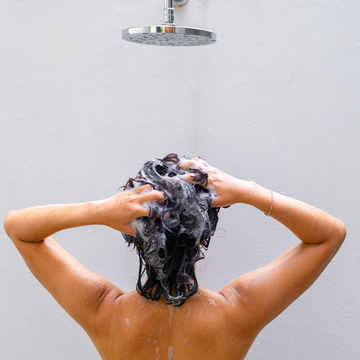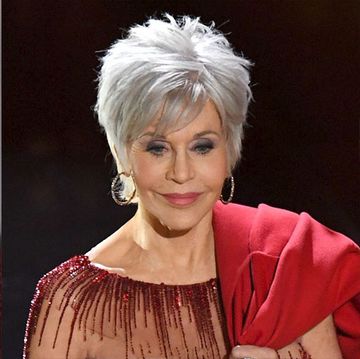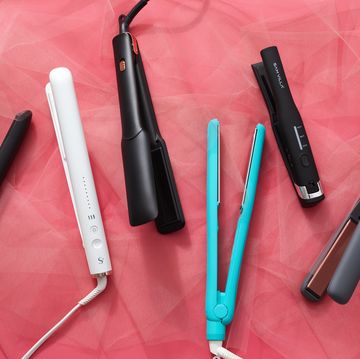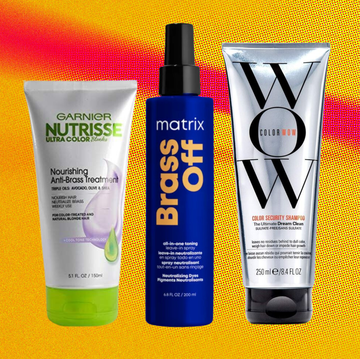There’s one beauty question that can make anyone feel like Goldilocks: How often should I wash my hair? Getting it just right can be tricky — wash too often, and you might end up with a dry, irritated scalp; not often enough, and your hair can become limp and greasy. To complicate matters, there’s no single right answer. Your ideal shampoo schedule depends on a variety of factors, from hair type to lifestyle. Just like different skin types require personalized skincare routines, hair types need tailored care, too.
“Washing your hair is not a one-size-fits-all process,” says Erinn Courtney, a hairstylist and natural hair expert based in Los Angeles. “Our hair is not made equally and needs special care. Finding what works best for you — whether it’s the right shampoo or how often you wash — often takes a bit of trial, error, and research.”
Jump to:
- What determines how often I should wash my hair?
- Is it okay to wash my hair every day?
- Is it healthy to wash my hair once a week?
- Is it better to not wash my hair?
- How many times a week should I wash my hair?
- How can I tell if I'm washing my hair too much?
- Should the season affect my shampoo schedule?
- How often should I use conditioner?
- How can I extend time between washes?
What determines how often I should wash my hair?
- Scalp oil: "Just like the face, some people are naturally oilier than others and can get buildup after a few days of not washing," says Dhaval G. Bhanusali, M.D., F.A.A.D., a board-certified dermatologist in New York.
- Activity level: If you are someone who sweats more when you are active, it may increase how often you need to shampoo.
- Hair type and texture: "Certain ethnicities require less frequent washing," Dr. Bhanusali explains. As a general rule of thumb, the thicker or curlier the hair, the less often it typically needs to be washed.
Is it okay to wash my hair every day?
That depends on your specific hair type and the shampoo you're using. “Washing your hair daily can lead to dryness and breakage, but it typically won’t cause excessive hair loss,” says Angela Styles, a hairstylist based in West Hollywood, CA. While some hair types should avoid daily washing for those reasons, those with very oily hair may actually benefit from it. “People with oilier scalps can wash every day because of the amount of oil their scalp produces,” adds Courtney.
According to Chiara Butler, a reviews analyst in the Beauty, Health & Sustainability Lab at the Good Housekeeping Institute, there are studies that suggest daily shampooing can support scalp health. “Two studies conducted on East Asian populations showed that markers of scalp health improved with a daily washing regimen,” Butler says. While this may not apply to all hair types, she agrees with Courtney that for people with oily scalps, daily washing can be beneficial — especially since skipping too many washes can lead to sebum buildup and potential scalp irritation.
Is it healthy to wash my hair once a week?
Dr. Bhanusali recommends regular washing to maintain a healthy scalp and hair. The ideal frequency depends on your hair type and texture — more on that below. He also cautions against overusing dry shampoo, suggesting it be limited to once or twice a week. “Using it too often has been associated with hair loss,” he warns.
Is it better to not wash my hair?
“Washing your hair is important for hair growth,” says Courtney. “It removes product buildup and dermatitis, both of which can negatively affect the scalp.” Shannon King, a partnering hair artist with KMS Hair, adds that skipping washes can lead to dryness, tangles and, potentially, hair loss. Their key takeaway: as long as your scalp and hair are healthy, your hair will grow.
Butler, agrees, explaining that "while shampooing can cause some mechanical damage and may contribute to color fading, not washing frequently enough can lead to a buildup of oxidized oils on the scalp, which causes irritation.” In fact, one study from Japan found that when participants reduced their usual wash frequency, yeast levels on the scalp increased — along with itching and flaking.
"I haven't seen any studies that correlate with hair growth and number of times you wash," adds Dr. Bhanusali.
How many times a week should I wash my hair?
Finding the right balance can be tricky. In general, if your hair isn’t particularly greasy or dry, washing every two to three days is a good rule of thumb, says King. However, washing too frequently for your hair type can be drying — especially depending on the ingredients in your shampoo. On the flip side, waiting too long between washes can lead to buildup on the scalp. “If your scalp becomes clogged, hair won’t be able to grow out of the follicle properly or at the rate it’s supposed to,” King explains.
Not sure how often to suds up? Don’t worry — we’ve got you. Below, our expert-approved guide breaks down how often you should shampoo based on your hair type.
- Oily hair: "Wash your hair every day to prevent buildup, unless you have very long hair or it's very coarse or curly," King says.
- Dry or damaged hair: It depends on the level of damage and dryness, but King typically recommends shampooing every five to seven days, as "you may need to allow some [of the hair and scalp's] natural oils to get in the mix." Courtney adds that "if hair is dry and damaged, it could be that you're shampooing too often." Make sure not to overuse clarifying shampoo, as it can strip hair of the nutrients it needs to remain healthy.
- Wavy or curly hair: Shampoo every four to five days, King suggests. "It will depend on the density of the hair, but this is a good estimate for this hair type," he notes. If that seems like too long of a stretch, shorten it by a day or two and see how your hair and scalp react.
- Coily hair: For natural hair types like this, both Courtney and King suggest washing once a week for optimal hair health. "Don't forget to follow with conditioner," King adds. "It's equally as important to condition as much as it is to cleanse."
- Fine or thin hair: "Fine hair will need to be shampooed as often as every other day to provide it with the moisture it needs to flourish and grow," Courtney says. Cleansing also helps remove buildup and oils that can weigh fine or thin hair down.
- Thick hair: "Thicker textures tend to hold onto moisture, so washing once per week is sufficient," Courtney advises.
- Relaxed hair: For relaxed hair, which is chemically treated and prone to dryness and breakage, Wizemann recommends washing it once or twice a week. "This will minimize damage and help the hair retain natural oils that keep hair conditioned, she says.
- Hair with dandruff: Dr. Bhanusali recommends washing three to four times per week for about one month to see if the dandruff lessens. After that, shampoo as needed. "Look for a shampoo specifically made for dandruff, like Nizoral, Selsun Blue or Head & Shoulders, which has pyrithione zinc," he suggests. "If you are still dealing with dandruff after a month of changing your washing routine and shampoo, it may be worth seeing a dermatologist for prescription options."
How can I tell if I'm washing my hair too much?
“When hair feels dry, fragile or frizzy, that may be a sign of excessive washing,” says GH Institute Beauty Lab Director Sabina Wizemann. Another red flag: an itchy or flaky scalp. “Just keep in mind that any underlying medical conditions or chemical treatments that could cause these symptoms should be ruled out before assuming overwashing is the culprit,” she adds.
Should the season affect my shampoo schedule?
As the seasons change, so should your hair care routine. Cold weather can cause the scalp to become drier, often leading to increased dandruff. “Shampooing more frequently — even daily or every other day in the winter — can help those who struggle with dryness and flaking,” says Courtney.
In contrast, people often shampoo less during the summer, particularly those with curly or coiled hair textures. “This gives drier scalps time to produce natural oils and allows that moisture to distribute through the hair strands before the next wash day,” she explains.
How often should I use conditioner?
“I generally recommend using conditioner every time you wash your hair, as long as the formula suits your hair type and thickness,” says Wizemann. “Most modern conditioners are tailored to specific hair types and textures. They’re designed not only to enhance the hair’s appearance but, more importantly, to improve manageability — which helps minimize damage from styling tools like brushes and blow dryers.”
In general, those with normal to thick hair can condition after every shampoo. However, if you have fine or oily hair, you may want to use conditioner less frequently or opt for a lightweight formula to avoid greasiness or weighing your hair down.
How can I extend time between washes?
If you're looking to stretch the time between washes, try one of these smart shampoo alternatives. Wizemann breaks down how each one works:
- Dry shampoos: These absorb excess oil and refresh your hair without water, making them a go-to for extending time between washes.
- Texturizing sprays, powders, and root lifters: Like dry shampoo, these products soak up oil while also adding volume and texture, helping hair look fuller and less greasy.
- Scented hair mists or perfumes: Designed specifically for hair, these light fragrances freshen up your strands without the intensity of body perfumes.
- Leave-in conditioners (meant to be applied on dry hair): These condition and detangle hair between washes, making styling easier without needing to rinse.
- Hair oils or serums: Ideal for smoothing and adding shine, especially to the ends, these products help seal the hair cuticle and tame frizz.
- Dense-bristle hair brushes (like boar bristle): These brushes distribute natural scalp oils through the lengths of your hair, helping to reduce greasy-looking roots.
- Hair sprays: Typically made with water-soluble polymers, these hold styles in place and can help hair appear more polished. Formulas range from flexible to strong hold.
Sabina (she/her) is the director of the Beauty, Health & Sustainability Lab at the Good Housekeeping Institute, where she has overseen skincare, haircare and makeup testing since 2012. She also reviews applications, substantiates claims and evaluates products for the GH Seal and the Beauty Awards and Sustainability Awards programs. She has a B.S. in chemistry from Ithaca College and more than 16 years of experience working in the pharmaceutical and personal care industries.

